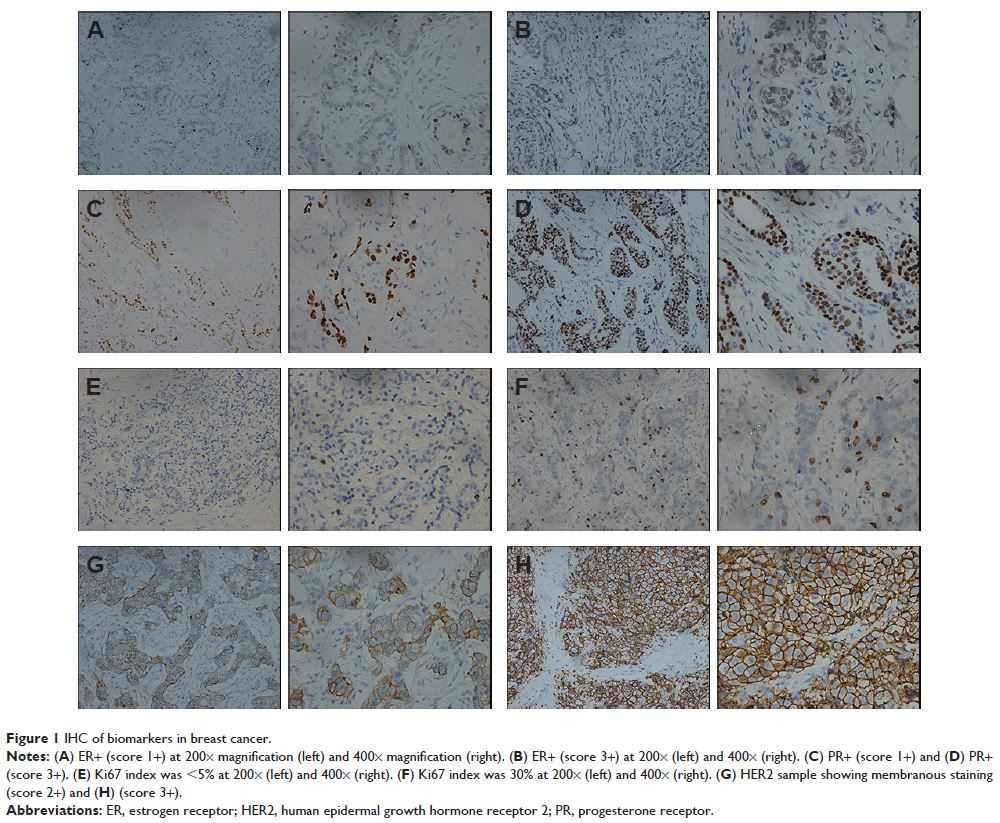108985
论文已发表
注册即可获取德孚的最新动态
IF 收录期刊
- 3.4 Breast Cancer (Dove Med Press)
- 3.2 Clin Epidemiol
- 2.6 Cancer Manag Res
- 2.9 Infect Drug Resist
- 3.7 Clin Interv Aging
- 5.1 Drug Des Dev Ther
- 3.1 Int J Chronic Obstr
- 6.6 Int J Nanomed
- 2.6 Int J Women's Health
- 2.9 Neuropsych Dis Treat
- 2.8 OncoTargets Ther
- 2.0 Patient Prefer Adher
- 2.2 Ther Clin Risk Manag
- 2.5 J Pain Res
- 3.0 Diabet Metab Synd Ob
- 3.2 Psychol Res Behav Ma
- 3.4 Nat Sci Sleep
- 1.8 Pharmgenomics Pers Med
- 2.0 Risk Manag Healthc Policy
- 4.1 J Inflamm Res
- 2.0 Int J Gen Med
- 3.4 J Hepatocell Carcinoma
- 3.0 J Asthma Allergy
- 2.2 Clin Cosmet Investig Dermatol
- 2.4 J Multidiscip Healthc

核心穿刺活检及随后的新辅助化疗对乳腺癌分子改变及预后的影响
Authors Xie L, Li X, Wang Q, Zhou J, Shen J, Luo L, Lu Y, Wang L
Received 6 July 2017
Accepted for publication 28 November 2017
Published 1 February 2018 Volume 2018:11 Pages 677—685
DOI https://doi.org/10.2147/OTT.S145715
Checked for plagiarism Yes
Review by Single-blind
Peer reviewers approved by Dr Manfred Beleut
Peer reviewer comments 3
Editor who approved publication: Dr Ingrid Espinoza
Objectives: The aim of our study is to evaluate the effect of core needle biopsy
(CNB) and subsequent neoadjuvant chemotherapy (NAC) on the expression of
estrogen receptor (ER), progesterone receptor (PR), human epidermal growth
hormone receptor 2 (HER2) and Ki67 in breast cancer, and the associated
influencing factors.
Materials and
methods: In this retrospective cohort study,
143 patients with primary operable breast cancer who received NAC were
included. ER, PR, HER2 and Ki67 statuses were compared between pretreatment and
posttreatment residual samples. A control group of paired core and excision
tumors from 123 patients who did not receive NAC within the same study period
was also assessed. Data on patients’ clinicopathologic features were collected
to identify associated influencing factors.
Results: Ki67 value significantly increased in excision tumors compared with
paired core samples in controls without presurgery treatment (P <0.01), which was associated
with the pathologic lymph node status and the interaction of PR and HER2 status
(P =0.008 and 0.028, respectively).
In 143 patients who underwent NAC, a significant decrease was observed in the
expression of PR and Ki67 after NAC (P =0.003 and P <0.01, respectively). Further
subgroup analysis showed that PR decrease was more obvious in premenopausal
patients and Luminal A patients (P =0.006 and 0.002,
respectively).
Conclusion: Core samples could provide more reliable information on determination of
molecular subtype than surgical excisions. Decreases in PR and Ki67 expression
following NAC could be used as positive prognostic factors. We recommend repeat
testing of these biologic markers following NAC for the sake of better disease
management. To the best of our knowledge, this is the most comprehensive study
to analyze the effect of neoadjuvant chemotherapy on molecular alteration and
its associated influencing factors after reporting a CNB-associated Ki67
increase in the same study.
Keywords: breast cancer, molecular change, neoadjuvant chemotherapy, core needle
biopsy
